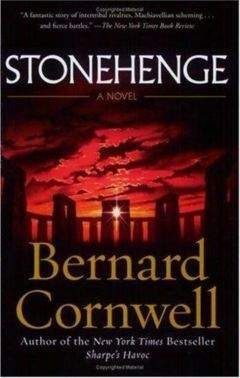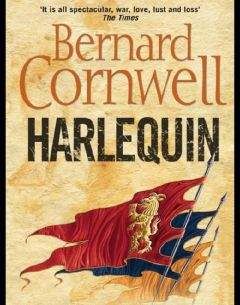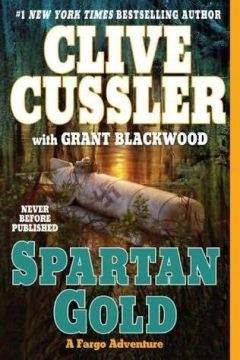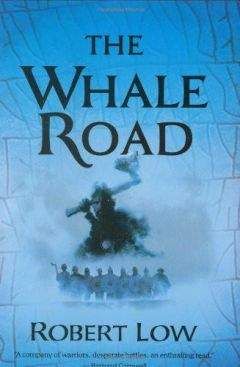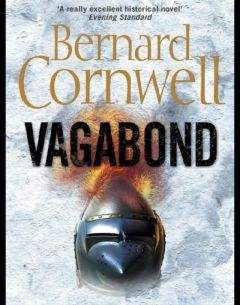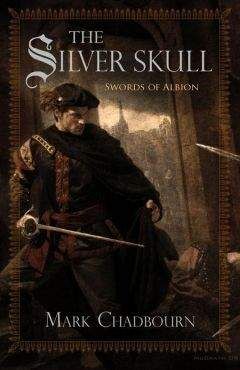The hole was the deepest Saban had ever dug. Its depth was almost twice the height of a man and he had protected its ramp and the face opposing the ramp with split tree trunks greased with pig fat. The ropes led from the stone clear across the hole, then across the ditch and banks to where the breath of sixty oxen formed a mist. Saban gave the signal and the ox drivers goaded their beasts and the twisted hide ropes lifted from the ground, went taut, quivered, stretched and then at last the stone lurched forward. 'Slowly now! Slowly!' Saban called. He feared that the slab might topple, but it edged forward safely enough, grinding splinters from the log rollers. Slaves pulled the logs from the back of the pillar as its leading edge began to jut out over the ramp. Then one of the ropes broke and there was a flurry of shouts and a long wait while a new rope was fetched and tied to the harness.
The oxen were goaded again and, finger's breadth by finger's breadth, the huge stone eased forward until half of it was poised above the ramp and the other half was still resting on the rollers, and then the oxen tugged once more and Saban was shouting at the beasts' drivers to halt the animals because the stone was tipping at last. For a heartbeat it seemed to balance on the ramp's edge, then its leading half crashed down onto the timbers. The ground shook with the impact, then the great boulder slid down the ramp to lodge against the hole's face.
Saban left the stone there that night. One end of the pillar jutted into the sky at an angle and the carved knob on its end, which would anchor the capstone of the highest arch, was stark against the winter stars.
Next day he ordered fifty slaves to bring baskets filled with chalk rubble and river stones to the edge of the hole, then he looped ten ropes about the canted stone. He led the ropes up over a tripod, which stood four times the height of a man, and then on to the oxen waiting beyond the ditch. The notch at the tripod's peak, over which the ropes would slide, was smoothed and greased. The ropes themselves were greased. Camaban and Haragg had both come to watch and the high priest could not contain his excitement. 'I don't suppose a greater stone has ever been raised!' Haragg exclaimed.
And if the stone broke now, Saban thought, then the temple would never be built for there was no slab long enough to replace this first great pillar.
It took the best part of the morning to arrange the ox teams, to anchor the tripod's legs in small pits dug into the soil just inside the bank and to attach the ropes, but at last all was ready and Saban waved at the ox drivers and watched as the ten ropes lifted from the ground. The tripod settled into the earth, it creaked, and the ropes went taut as bronze bars. The men beyond the ditch stabbed the oxen with goads so that blood poured down their hind legs. The ropes seemed to catch in the tripod's peak for there was a jerk and a shudder, but then they slid and there was suddenly a small gap between the pillar and the ramp and the slaves began to cram the gap with the stones fetched from the river.
'Drive them!' Saban shouted. 'Drive them!' And the oxen had their heads down and the trembling tripod creaked as the stone edged up, its front edge gouging the timbers that faced the deep hole, but the higher the stone went the easier the hauling became because the ropes, coming from the tripod's peak, were now pulling at a right angle to the stone. Saban watched, holding his breath, and still the stone was rising and its base was grinding the hole's face and the slaves were desperately hurling baskets of chalk rubble and stones into the ramp so that if the stone did fall back it would not collapse all the way.
'Drive them! Drive them!' Camaban shouted, and the goads prodded, the ropes quivered, the oxen bled and the stone shuddered upwards.
'Slow now! Slow!' Saban cautioned. The pillar was close to its full height and if the oxen pulled too hard now there was a danger they might pull the pillar clean over and out of its socket. 'Just one step more!' Saban called, and the ox teams were goaded a last time and the stone shifted another fraction and then its own weight took over and the pillar thumped upright, its leading edge smashing into the protective timbers with a sickening crash. Saban held his breath, but the stone stayed where it was and he screamed at the slaves to fill the hole's edges and ram down the filling. Camaban was clumsily leaping up and down and Haragg was crying for joy. The first, the tallest stone of the temple was raised.
The ropes were taken away, the hole was filled, and at last Saban could step back and see what he had done.
He saw a marvel to exceed any at Cathallo, a marvel such as no man had ever seen in all the world.
He saw a stone standing as high as a tree.
His heart seemed to swell as he looked at it and there were tears in his eyes. The stone looked gaunt and high and slender against the grey winter sky. It looked, Saban thought, beautiful. It was smooth and shaped and awesome; it suddenly dominated the wide landscape. It towered over the mother stone which he had previously thought so huge. It was magnificent.
'It's splendid,' Camaban said, his eyes wide.
'It is Slaol's work,' Haragg said humbly.
Even the slaves were impressed. It was their work, and they looked at the pillar in wonder. In none of their tribes, in none of their temples, in none of their lands and in none of their dreams was there a stone so large and sculpted and stark. At that moment Saban knew the gods must recognise what Camaban was doing and even Kilda was impressed. 'And you will place another stone on top of that?' she asked Saban that evening.
'We will,' he said, 'for that is just one pillar of an arch.'
'But you still don't know how?'
'Maybe the gods will tell me,' he said. They were alone by the great stone. Night was falling, turning the grey rock black. Saban gazed up the monolith and was overcome again, astonished that he had ever moved it, ever shaped it, ever raised it, and he knew at that instant that he would finish the temple. There were men who said it could not be done, and even Camaban did not know how it could be achieved, but Saban knew he would do it. And he felt a sudden certainty that by building the temple he would appease the gods who would then forgive him the oath he had sworn on Lallic's life. 'I sometimes think,' he told Kilda, 'none of us really knows why we are building this temple. Camaban says he knows, and Aurenna is certain it will bring the gods to a marriage bed, but I do not know what the gods want. Except that they want it built. I think it will surprise us all when it's done.'
'Which is what Derrewyn always said,' Kilda answered.
Midwinter came and the tribe lit their fires and made their feast. The slaves ate by the temple and after midwinter, when the first snow came, they began shaping the second pillar of the long arch. That pillar was the second longest stone, but it was too short for Saban had been unable to find a stone as long as the first, so he had deliberately left the second pillar's foot clubbed and bulbous, just like Camaban's foot before Sannas had broken and straightened it, and he hoped that the heavy clubbed foot would anchor the pillar in the earth. He would sink it in a hole he knew was too shallow, but the hole had to be shallow if the second pillar were to match the height of the first.
He raised that stone in the spring. The tripod was placed and the oxen were harnessed and when the beasts took the stone's weight Saban heard the pillar's clubbed foot scrunching the chalk and timbers, but at last it was standing and the hole could be filled and there were two pillars in the earth now, side by side and so close together at their base that a kitten could scarce wriggle between them, while at their tops the twin pillars tapered and so made a gap through which the winter sun would shine.
'When do you put the top stone on?' Camaban asked.
'In a year's time,' Saban said, 'or maybe two.'
'A year!' Camaban protested.
'The stones must settle,' Saban said. 'We'll be ramming and filling the holes all year.'
'So every pillar must stand a year?' Camaban asked, appalled.
'Two years would be better.'
Camaban became even more impatient then. He was frustrated when oxen were stubborn or ropes broke or, as happened twice, a tripod splintered. He hated it when stones ended up canted and it took days of hard work to haul them straight and ram their bases with rocks and soil.
It took three whole years to shape and raise the ten tall pillars of the sun's house. The raising of the stones was the easiest part; the hardest was the grinding and shaping that still filled the temple with noise and dust. The knobs on the pillars' tops, which would anchor the capstones, proved hardest to carve, for each was twice the width of a man's hand and to make the knobs the slaves had to wear away the rest of the pillar's top, which they did dust grain by dust grain. Saban also had them leave a lip around the stone's edge so that the capstones would be held at their sides as well as by the protruding knobs.
Leir became a man in the year that the last of the sun house's pillars was raised, the same year that six of the sky-ring stones were sunk in the ground. Leir passed his ordeals and gleefully broke the chalk ball of his spirit into fragments. Saban gave him a bronze-headed spear, then hammered the tattoos of manhood into his son's chest. 'Will you go and show yourself to your mother?' he asked his son.
'She will not want to see me.'
'She will be proud of you,' Saban said, firmly, although he doubled that he spoke the truth.
Leir grimaced. 'She will be disappointed in me.'
'Then go to see your sister,' Saban said, 'and tell her I miss her.' He had not seen Lallic since he had taken Leir away from his mother, not since he had sworn her life on the skull pole.
'Lallic sees no one,' Leir said. 'She is frightened. She shivers in the hut and cries if her mother leaves her.'
Saban feared his false oath had settled a dreadful curse on his daughter and he decided he would have to see Haragg, swear the high priest to silence, confess the truth and do whatever penance Haragg commanded.
But it was not to be. For on the night when the ordeals finished, before Saban could find him, Haragg gave a great cry and died. And Camaban went mad.
Camaban howled as he had when his mother had died. He howled in unassuageable grief, claiming that Haragg had been his father. 'He was my father and my mother,' he shouted, 'my only family!' He drove the slave girls from his hut and slashed himself with flints so that his naked body was laced with blood when he emerged into the daylight. He threw himself onto Haragg's corpse, wailing that the high priest was not really dead at all, but sleeping, though when he tried to breathe his own life into Haragg's soul, the corpse stubbornly remained dead. Camaban turned on Saban then. 'If you had finished the temple, brother, he would not have died!' Camaban was quivering, scattering droplets of blood onto Haragg's body, then he snatched up handfuls of turf and hurled them at Saban. 'Go!' he shouted. 'Go! You never really loved me! You never loved me, go!'
Gundur hurried Saban out of Camaban's sight behind a hut. 'He'll kill you if you stay.' The warrior frowned as he listened to Camaban's howls. 'The gods are in him,' Gundur muttered.
'That was Haragg's tragedy,' Saban answered drily.
'His tragedy?'
Saban shrugged. 'Haragg loved being a trader. He loved it. He was curious, you see, and he wandered the land to look for answers, but then he met Camaban and he believed he had found the truth. But he missed the trader's life. He shouldn't have stayed here as high priest, for he was never the same man after.'
Camaban insisted that Haragg's body would not be taken to the Death Place, but must lie in the new temple's death house and so the corpse was carried on a hurdle and placed between the mother stone and the tallest pillars that still awaited their capstone. The whole tribe accompanied the body. Camaban wept all the way. He was still naked, his body a web of crusted blood, and at times he threw himself to the turf and had to be persuaded onwards by Aurenna who had come from Cathallo at the news of Haragg's death. She wore a robe of grey wolf fur into which she had rubbed ashes. Her hair was dishevelled. Lallic, almost grown now, was at her side. She was a wan and thin girl with pale eyes and a frightened expression. She looked startled when Saban approached her. 'I will show you the stones,' he told Lallic, 'and how we shape them.'
'She already knows,' Aurenna snapped. 'Lahanna shows her the stones in her dreams.'
'Does she?' Saban asked Lallic.
'Every night,' the girl answered timidly.
'Lallic!' Aurenna summoned her, then glared at Saban. 'You have taken one child from the goddess. You will not take another.'
The slaves stayed in their huts that day as the women of the tribe danced about the temple's ditch and bank, singing Slaol's lament. The men danced inside the temple, threading their heavy steps between the unfinished boulders and the emptied sledges. Camaban, some of his cuts reopened and bleeding, knelt beside the body and shrieked at the sky while Aurenna and Lallic, the only women who had been allowed to cross the temple causeway, cried loudly on either side of the corpse.
What shocked Saban was that two priests then led an ox into the temple. Haragg had hated the sacrifice of anything living, yet Camaban insisted the dead man's soul needed blood. The beast was hamstrung, then its tail was lifted so that its head dropped and Camaban swung the bronze axe, but his blow merely glanced off one of the horns and gouged into the animal's neck. It bellowed, Camaban struck again, missed again, and when a priest tried to take the axe from him he swung it round in a dangerous arc, just missing the man, then hacked at the animal in a maniacal frenzy. Blood spattered on the mother stone, on the corpse, on Aurenna and Lallic and Camaban, but at last the hobbled beast crumpled and Camaban drove the axe deep into its spine to end its torment. He threw the axe down and dropped to his knees. 'He will live!' he cried, 'he will live again!'
'He will live,' Aurenna echoed, then she put her arms around Camaban and lifted him up. 'Haragg will live,' she said softly, stroking Camaban who was weeping on her shoulder.
The body of the heifer was dragged away and Saban angrily scuffed chalk dust over the blood splashes. 'There was never supposed to be sacrifice here,' he said to Kilda.
'Who said so?' she asked.
'Haragg.'
And Haragg is dead,' she answered grimly.
Haragg was dead and his body stayed in the sun house where it slowly decayed so that the stench of the dead priest was ever in the nostrils of the men digging the holes and shaping the stones. Ravens feasted on the corpse and maggots writhed in his rotting flesh. It took a whole year for the corpse to be reduced to bone, and even then Camaban refused to let it be buried. 'It must stay there,' he decreed, and so the bones remained. Some were taken by animals, but Saban tried to keep the skeleton whole. Camaban recovered his wits during that year and declared that he would replace Haragg, which meant he was now chief and high priest. He insisted that Haragg's bones needed the blood of sacrifices, therefore he brought sheep, goats, oxen, pigs and even birds to the temple and slaughtered them above the dry bones that became stained black with the constant blood. The slaves avoided the bones, though one day Saban was shocked to see Hanna crouching over the drenched skeleton. 'Will he really live again?' she asked Saban.
